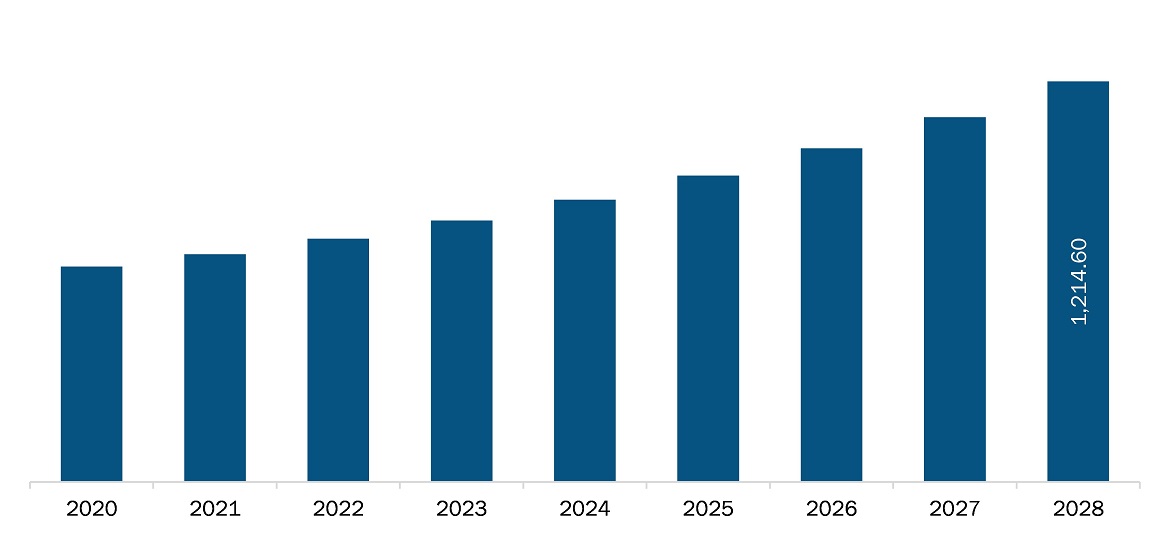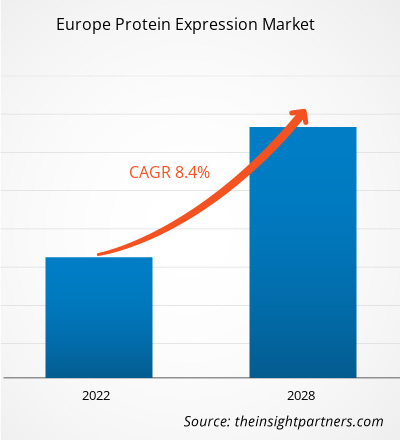The protein expression market in Europe is expected to grow from US$ 690.1 million in 2021 to US$ 1,214.6 million by 2028; it is estimated to grow at a CAGR of 8.4% from 2021 to 2028.
The pharmaceutical and biotechnology industries have developed various techniques to treat cancer and neurodegenerative diseases. The transient gene expression technique has led to significant developments in the research related to neurotrauma and neurodegenerative diseases and introduced precision medicines for these conditions. Technological advancements in epigenetics, genetics, and proteomics support the development of therapeutics for the treatment of various genetic and rare genetic diseases caused by single and multiple cell disorders. Thus, the continuous research and development activities and growing government initiatives to support precision medicine boost the adoption of protein expression techniques.
In Dec. 2020, QIAGEN has launched its QuantiFERON SARS-CoV-2 RUO solution that can detect human immune system T-cell responses to the COVID-19-causing pathogen, which may help researchers, learn more about immunity levels and disease progression. Further, the Dyadic’s proprietary C1 expressed receptor binding domain (RBD) of the SARS-CoV-2 spike protein is being used in animal trials by seven research groups, governmental agencies and biopharma companies, including the Israel Institute for Biological Research (IIBR) and a collaboration of European Union scientists participating in the ZAPI programme. However, the demand for protein expression in market in Europe during is likely to increase as the rapidly growing cases of Covid -19 and prevalence of diseases such as cancer needs research for drug development where use of protein expression is important, hence it can boost the growth of the protein expression market
With the new features and technologies, vendors can attract new customers and expand their footprints in emerging markets. This factor is likely to drive the protein expression market. The Europe protein expression market is expected to grow at a good CAGR during the forecast period.

- This FREE sample will include data analysis, ranging from market trends to estimates and forecasts.
Europe Protein Expression Market Segmentation
By Product
- Competent Cells
- Expression Vectors
- Reagents
- Instruments
By Services
- Antibody Development & Production
- Protein Expression & Production
- Hybridoma One-Stop Services
- Stable Cell Line Development
- Bioanalytical Assay Services
By Application
- Research
- Therapeutic
- Industrial
By End User
- Pharmaceutical and Biotechnology Companies
- Contract Research Organizations
- Academic Research Institutes
- Others
By Country
Europe
- Germany
- UK
- France
- Spain
- Italy
- Rest of Europe
Companies Mentioned
- Thermo Fisher Scientific Inc.
- GenScript
- Merck KGaA
- Agilent Technologies, Inc.
- Takara Bio Inc.
- Bio-Rad Laboratories Inc.
- QIAGEN
- New England Biolabs
- Promega Corporation
- Oxford Expression Technologies
Europe Protein Expression Report Scope
| Report Attribute | Details |
|---|---|
| Market size in 2021 | US$ 690.1 Million |
| Market Size by 2028 | US$ 1,214.6 Million |
| Global CAGR (2021 - 2028) | 8.4% |
| Historical Data | 2019-2020 |
| Forecast period | 2022-2028 |
| Segments Covered |
By Product
|
| Regions and Countries Covered | Europe
|
| Market leaders and key company profiles |
- Historical Analysis (2 Years), Base Year, Forecast (7 Years) with CAGR
- PEST and SWOT Analysis
- Market Size Value / Volume - Global, Regional, Country
- Industry and Competitive Landscape
- Excel Dataset


- Medical and Research Grade Collagen Market
- Legal Case Management Software Market
- Dairy Flavors Market
- Transdermal Drug Delivery System Market
- Smart Mining Market
- Sports Technology Market
- Medical Devices Market
- Machine Condition Monitoring Market
- Nuclear Waste Management System Market
- USB Device Market

Report Coverage
Revenue forecast, Company Analysis, Industry landscape, Growth factors, and Trends

Segment Covered
This text is related
to segments covered.

Regional Scope
North America, Europe, Asia Pacific, Middle East & Africa, South & Central America

Country Scope
This text is related
to country scope.
Trends and growth analysis reports related to Life Sciences : READ MORE..
- Thermo Fisher Scientific Inc.
- GenScript
- Merck KGaA
- Agilent Technologies, Inc.
- Takara Bio Inc.
- Bio-Rad Laboratories Inc.
- QIAGEN
- New England Biolabs
- Promega Corporation
- Oxford Expression Technologies

 Get Free Sample For
Get Free Sample For